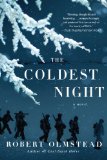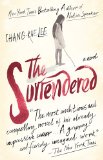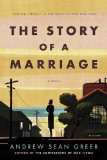Summary | Excerpt | Reviews | Beyond the book | Read-Alikes | Genres & Themes | Author Bio

Critics' Opinion:
Readers' Opinion:
First Published:
Apr 2012, 304 pages
Paperback:
Apr 2013, 320 pages
 Book Reviewed by:
Book Reviewed by:
Mark James
Buy This Book
War has long been the dominion of tyrants and megalomaniacs. And, like love, so too has it been fodder for writers. Both of these subjects have been the provenance of a host of poesy as old as the written word - one need only pick up The Iliad as proof. In his novel, The Coldest Night, Robert Olmstead marries the two topics while also pitting them against each other. The story is set in the seemingly simple time of 1950s America on the eve of the Korean War, but, as love and war are never simple, the couple in Olmstead's novel struggle to survive.
Henry Childs, the son of a lower-class single mother, meets and falls in love with Mercy, the daughter of a judge "known for the empery of his opinion... and wealth." It's a frowned-upon relationship that crosses social boundaries, and after Mercy graduates high school, Henry is told by the judge, "it's over now... you go back to your people." The judge's directive initiates the first of several journeys as the the couple rebelliously runs away from West Virginia to New Orleans, where Mercy has "enough relatives who hate [her] father" and would be willing to support the couple out of spite.
Mercy believes that "this love will take care of us," but they soon learn that the link between romance and reality is tenuous. Mercy's father tracks her down and forces her to come home, and Henry ends up in the Marine Corps off the coast of North Korea on the eve of the battle of the Chosin Reservoir, one of the most brutal battles in our country's history. But when he returns home, the troubles he finds are equally difficult.
1950 was a relatively obscure and quiet year in America; World War II had ended five years earlier, Eisenhower had yet to be elected, and the race to the moon was not even a dream. When Henry tells a waitress that he just returned from fighting in the Korean war, she asks "what war is that?... I don't think I've heard of it." Despite the seemingly stagnant time, Henry and Mercy are not stagnant characters; together this poor boy and rich girl cross social boundaries and rebel against the status quo. If Henry or Mercy had been narrating, the story might have seemed little more than impetuous teenagers running away from Daddy. But instead, Olmstead uses a third-person omniscient narrator - well educated and with a poetic delivery - that provides the story with legitimacy.
Olmstead clearly relishes word play. The lyrical writing set against a backdrop of violence provides a surreal aspect to the story. The prose alone is worth the read; rarely does such a novel come along. Olmstead opens with Henry's 92-year-old grandfather trekking through deep snow, "keeping on for a day and a night, his snowshoes silently lifting and falling... because he knew to stop would be to stop forever." The writing turns merciless when war is its subject; Henry muses during the battle that "men did not look human after war's subtraction: no eye, no ear, no nose, no face, no arm, no leg, no gut, no bowel, no bone, no spine, no muscle, no nerve, no breath, no heart, no brain, no faith." It's an unflinchingly realistic, yet artistic, condemnation of war.
Disparate backgrounds and desperate times are a seductive combination. Olmstead makes good use of them, and what ultimately distinguishes his exceptional work from more pedestrian literature is his elegant prose. "Prosody" - the study of the art of versification - is a word that Henry may not have recognized, but readers of The Coldest Night will not have to consult a dictionary for its definition; Olmstead's writing demonstrates its meaning perfectly.
![]() This review was originally published in The BookBrowse Review in April 2012, and has been updated for the
May 2013 edition.
Click here to go to this issue.
This review was originally published in The BookBrowse Review in April 2012, and has been updated for the
May 2013 edition.
Click here to go to this issue.

If you liked The Coldest Night, try these:

by Chang-rae Lee
Published 2011
A stunning story about how love and war inalterably change the lives of those they touch, The Surrendered is elegant, suspenseful, and unforgettable: a profound meditation on the nature of heroism and sacrifice, the power of love, and the possibilities for mercy and salvation.

by Andrew Sean Greer
Published 2009
From the bestselling author of The Confessions of Max Tivoli, a love story full of secrets and astonishments set in 1950s San Francisco.





The Flower Sisters
by Michelle Collins Anderson
From the new Fannie Flagg of the Ozarks, a richly-woven story of family, forgiveness, and reinvention.

The House on Biscayne Bay
by Chanel Cleeton
As death stalks a gothic mansion in Miami, the lives of two women intertwine as the past and present collide.

The Funeral Cryer by Wenyan Lu
Debut novelist Wenyan Lu brings us this witty yet profound story about one woman's midlife reawakening in contemporary rural China.
Your guide toexceptional books
BookBrowse seeks out and recommends the best in contemporary fiction and nonfiction—books that not only engage and entertain but also deepen our understanding of ourselves and the world around us.